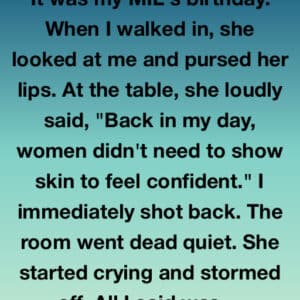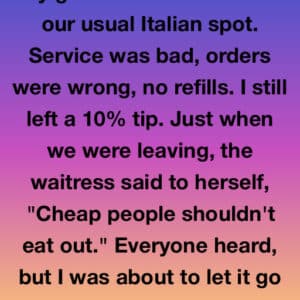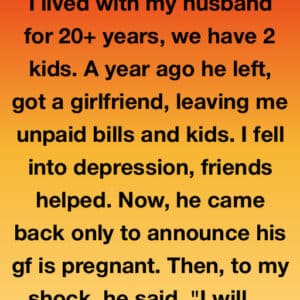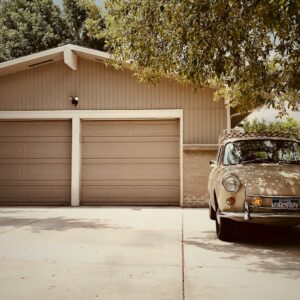I was still in my black funeral dress, standing in the kitchen, when my brother called and said, through tears, “You knew.” He kept repeating it, like if he said it enough times it would become true.
Our parents were old-school—hardworking, frugal, proud. Dad was a mechanic, Mom ran the bakery until her hands gave out. The plan had always been simple: everything split between me and my brother, Ghilan. They told us that for years. I moved back in when Dad’s memory started slipping. I did the appointments, the forms, the bathing, the arguing with insurance. Not for a payout—because that’s what you do.
So when the lawyer slid the will across the table and I read “We bequeath all assets to our trusted friend, Ms. Irene Kappel,” the room narrowed. Irene. The neighbor who brought Mom soup. The woman who sat with her when I ran errands. I looked at Ghilan. He looked at me like I’d switched the papers.
“She helped them change it,” he said.
“No,” I said, even though it sounded like a question. He walked out without another word. That was the last time I saw him for weeks.
I tried to make sense of it. Irene had lived two doors down for twenty years. Quiet, kind. After Mom’s stroke, she was around more. I never saw anything suspicious—just a lonely woman helping. But the will said what it said, and my brother decided I’d orchestrated it. His wife left a cold message: “This is betrayal, Nura. I hope you’re happy.” I threw my phone at the couch and missed.
Two weeks later, I knocked on Irene’s door. She opened it like she’d been expecting me, put on tea, and let me talk.
“I’m not here to accuse you,” I said. “I need to understand.”
She folded her hands. “Your mother asked me to find someone at church to help with the paperwork. I wasn’t in the room when they signed. They said they didn’t want to burden you two. That’s the word your mom used—burden.” She looked embarrassed by it. “They thought this would prevent fighting.”
“Well,” I said, sharper than I meant to, “that didn’t work.”
For a while, life went sideways. Irene let me stay in my parents’ house—she paid the utilities, said she wasn’t ready to sell. It felt like charity, like a transaction I hadn’t agreed to. Meanwhile, I wrote long emails to Ghilan he didn’t answer. I drove to his house once, sat in my car watching the porch light go on and off, unable to get out.
Then he sent an email with a single line: “Come to this.” A flyer for a panel at the community center—“Understanding Elder Financial Abuse.” His name was on it.
I went. He never looked at me during the talk, but it felt like he was speaking straight at me: how expectations and reality tear families apart, how people grow vulnerable as their world shrinks. During Q&A I stood up. “My parents left everything to a neighbor,” I said. “My brother thinks I convinced them. I didn’t. How do you fix something when the only people who can explain aren’t here anymore?”
Silence. Then he finally met my eyes.
A few weeks later, he emailed again: lunch? We picked a Lebanese place halfway between us. We avoided the big thing, joked about Mom’s lentil soup, ordered too much. Then he said, quietly, “I wanted to believe you were in on it. It made everything make sense.”
“I wanted to believe Irene tricked them,” I admitted. “I don’t think she did.”
“So why’d they do it?” he asked.
I shrugged. “Maybe they didn’t trust us not to fight. Maybe they didn’t want to pick favorites. Maybe they were confused.”
“We wouldn’t have fought,” he said.
We both knew we might have. We’d kept score for years—who visited more, who paid more, who was more loved—while pretending we weren’t keeping score. Maybe our parents saw that and tried to skip the fight altogether.
We started texting after that. Old photos surfaced. Stories we’d forgotten. It felt like stacking bricks back on a foundation we’d cracked ourselves.
Then Irene called. “I’ve been thinking,” she said. “I’m getting older too. I don’t want to manage all this. Your parents would want you to benefit.” I braced for something awful. Instead: “I want to transfer the house and the rental back to you and your brother. I’ll keep the savings. I’m comfortable. I don’t need it all.”
She didn’t owe us anything. Legally, morally—nothing. But she said it felt wrong, that she’d prayed on it, that maybe our parents had been more confused than she wanted to believe at the time.
Two weeks later we signed papers at the title office. Afterward we went to the old house and sat on the living room floor. “Maybe they didn’t know what they were doing,” I said. “Maybe this is what they’d want now,” he said.
We turned the place into something small and good—a memory room. Photos, recipes, recordings of Mom telling stories, a corner with Dad’s tools and a sign that says “Wash your hands.” Irene came to the opening. In the guestbook she wrote, “They raised good kids. I should’ve seen it sooner.”
Life rarely ties itself up neatly. But if you stay open, people surprise you. Forgiveness is slow work, and it holds better than anger. If this made you think of someone you’ve drifted from, maybe it isn’t too late to reach out. And if it shifted something in you, pass it on.





